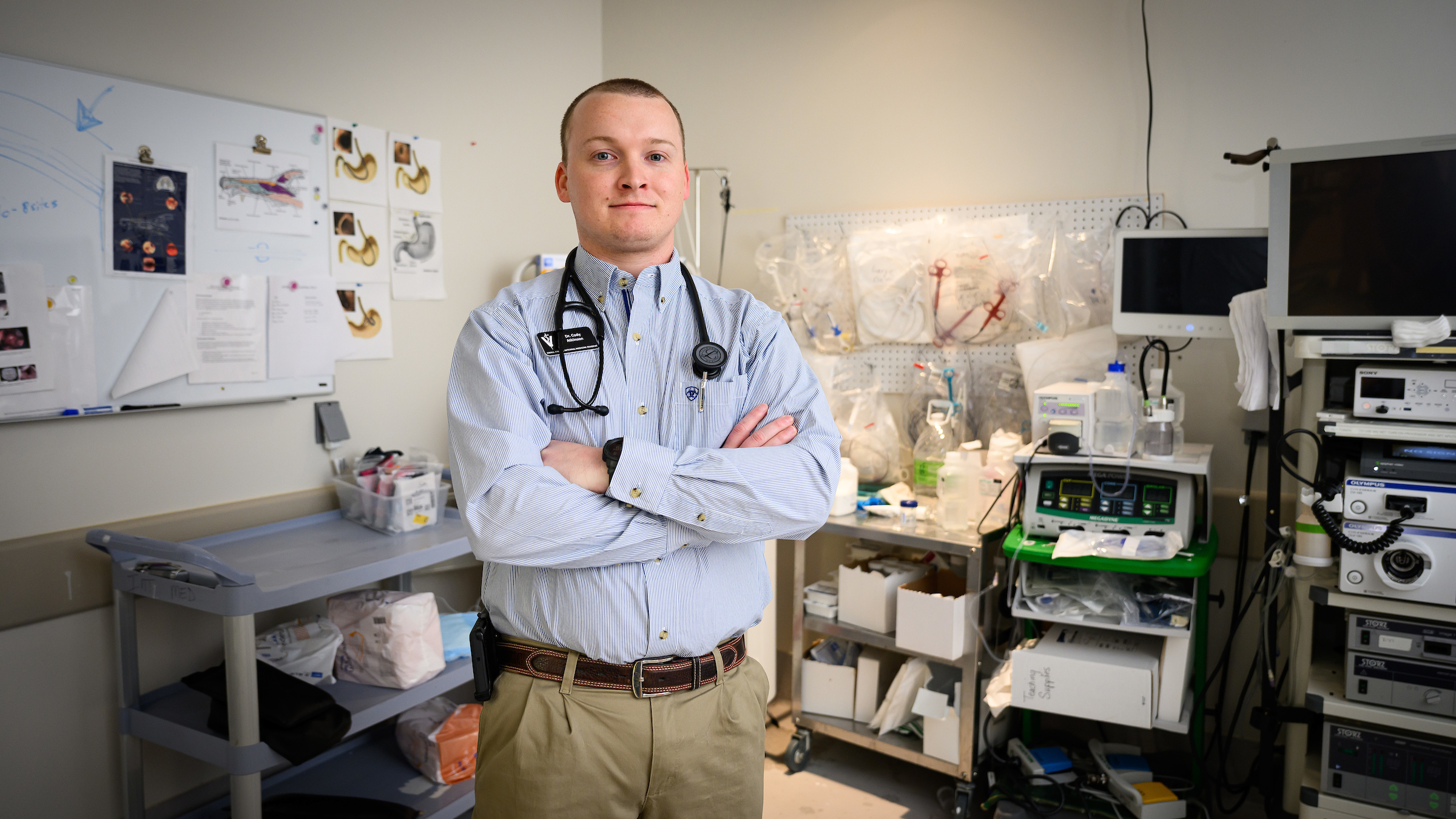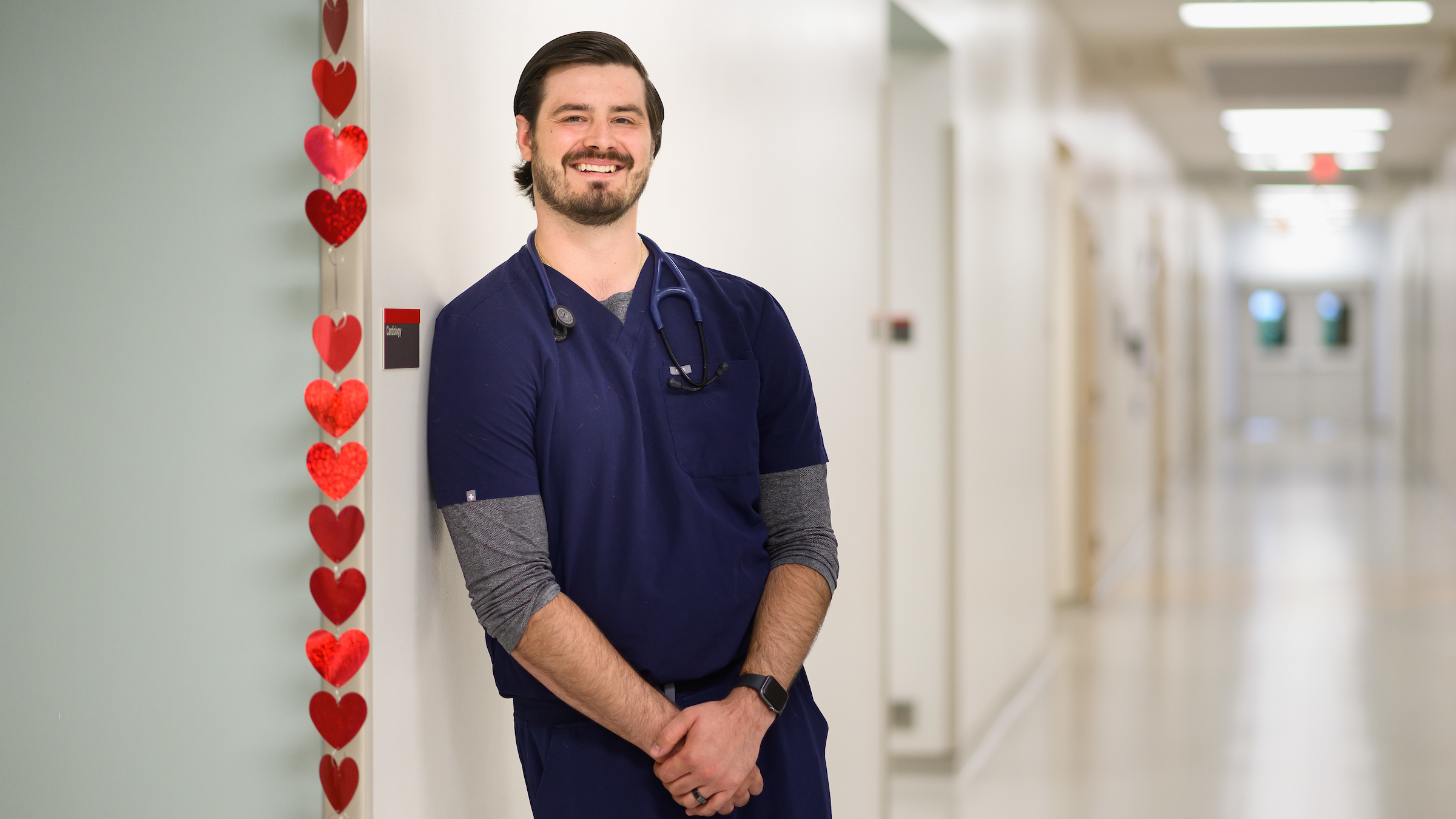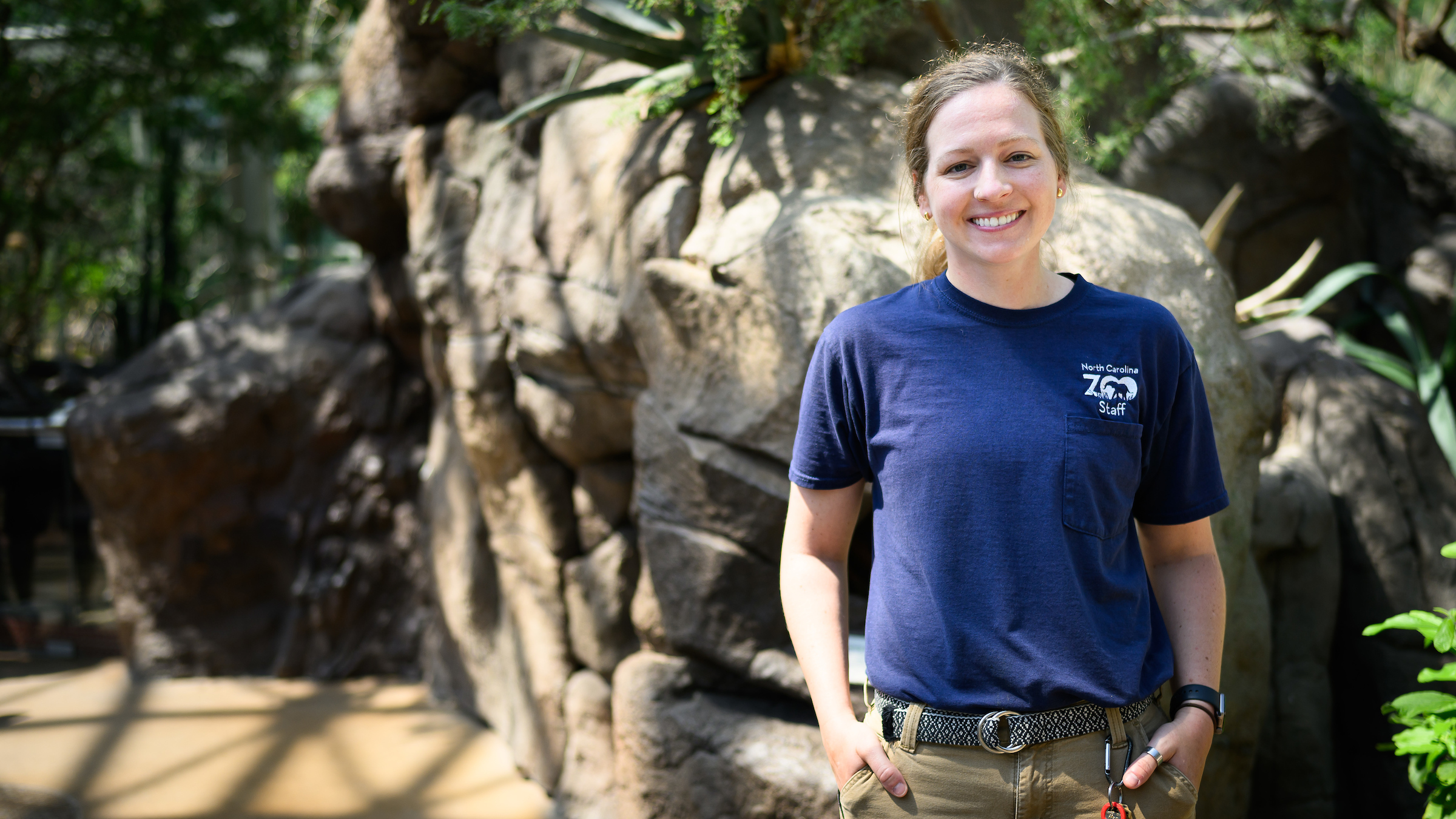House Officer Highlight: This ‘Biology Detective’ Solves Medical Mysteries in Animal and Human Health
Nearly every diagnostic test or research study that involves cell, tissue or fluid samples requires a pathologist’s trained eye. Luckily, the NC State Veterinary Hospital has third-year comparative pathology resident Dr. Jazz Stephens.
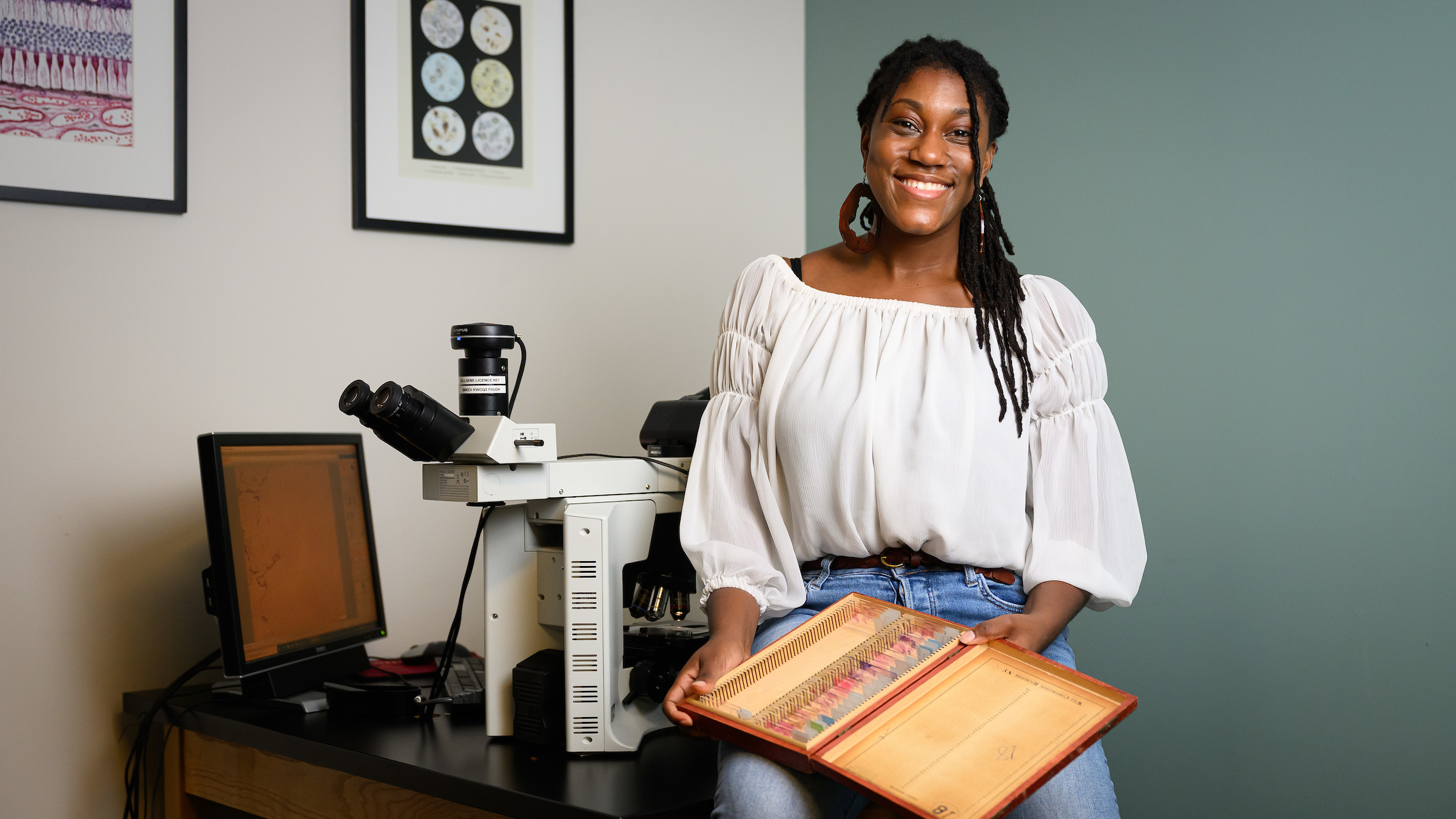
Dr. Jazz Stephens gets animated when talking about her various research studies involving pigs — but don’t call her the “pig lady.”
What really excites Stephens, a third-year comparative pathology resident at the NC State College of Veterinary Medicine, is the opportunity to understand how the porcine immune system functions and how those findings may apply to human health.
Comparative medicine jointly improves animal and human wellness by identifying similarities in disease progression and treatment outcomes across species. When Stephens isn’t analyzing cell samples from pigs and other common animal models in research, she turns her microscope toward helping veterinarians diagnose and treat conditions in client-owned pets at the NC State Veterinary Hospital, starting with biology’s most basic building blocks.
“Pathology lends itself very well to research just because it is so broad, but it also allows you to get nerdy about it and get to the nitty-gritty, which I adore,” Stephens says. “I love telling people I’m basically a biology detective. As pathologists, not only are we figuring out why a disease occurs, but how do we prevent it from happening in the future?”
Stephens’ residency program, a joint offering between NC State and the University of North Carolina at Chapel Hill’s Division of Comparative Medicine, has exposed her to the full spectrum of veterinary care while allowing her to explore the many avenues available within a pathology career.
Stephens, meanwhile, gets to get nerdy about her passions every single day.
“I truly do love pathology,” she says. “I truly do love looking at a cool slide and just being able to piece together the mystery.”
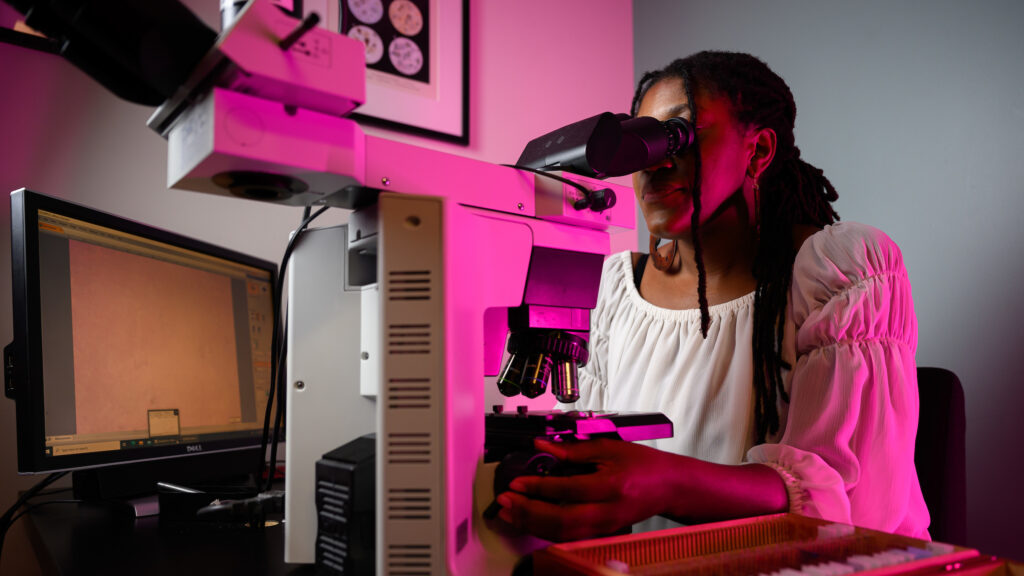


Scoping Out a Career
Growing up in Stone Mountain, Georgia, Stephens always entertained the idea of being a veterinarian despite not having pets or exposure to the veterinary field.
She studied biology at Agnes Scott College in Decatur, Georgia, a women’s college that Stephens says did not have a pre-veterinary program at the time. With friends’ support, Stephens founded a pre-vet club and began building a veterinary network at the college while scouting internships and opportunities to get into a practice.
“When I was looking for a veterinary clinic to shadow or work in, I was literally going door to door, my resume in hand, which is laughable,” says Stephens, who graduated with her bachelor’s in 2018. “I just called a lot of people, being really persistent and a little annoying, and eventually enough people said yes and I passed on their information to other students.”
Between volunteering in Atlanta-area small animal practices and completing a summer internship at Yerkes National Primate Research Center, Stephens learned that she preferred the solitary and self-driven realm of research to a bustling clinic. A mentor’s introduction to a veterinary pathologist in college showed Stephens a new path toward her goals.
At the University of Georgia College of Veterinary Medicine, Stephens met more top-notch pathologists including Dr. Kaori Sakamoto, an NC State DVM alumna who returned to Raleigh this summer to lead NC State’s Department of Population Health and Pathobiology.
“Dr. Sakamoto is the person I approached when I said I was interested in pathology, and she told me, ‘This is where you need to go and who to talk to,’” Stephens says. “She told me about the PathHeads Club, which is the pathology club at UGA. She was really instrumental in getting me on the right track and helping me become a pathologist, even during vet school.”
Before graduating with her DVM in 2022, Stephens led PathHeads and completed externships at private diagnostic labs, pharmaceutical company Merck and universities across the Southeast, including Wake Forest University and the University of Florida.
“There doesn’t tend to be, especially at vet schools, much of a focus on comparative pathology,” Stephens says. “These externships gave me a broader mindset of what pathology can entail and how integral pathologists are in pharmaceutical development and other avenues within translational research.”
Pathology is one of a handful of veterinary medicine specializations that generally don’t require trainees to complete an internship before residency. Once Stephens realized a residency was in her future, she found exactly what she was looking for at NC State.
The Big Picture
Stephens’ joint comparative pathology residency program divides her time between NC State and UNC-Chapel Hill and broadens her pathology experiences further still. Though the joint program is being phased out, NC State’s anatomic pathology residency continues to offer future pathology trainees many opportunities at the College of Veterinary Medicine.
At NC State, Stephens helps teach pathology to DVM students and works on the biopsy and necropsy services, analyzing tissues to make diagnoses in animals seen across the Veterinary Hospital. At UNC-Chapel Hill, she assistant teaches a graduate class on pathology and histology and also monitors the health of research animals.
“My goal was to come out of this program not only skilled in comparative pathology, but also well-rounded enough that if anyone had any questions about all the species that we encounter in veterinary medicine, I’d be able to understand what was going on or at least point them in the right direction,” Stephens says.
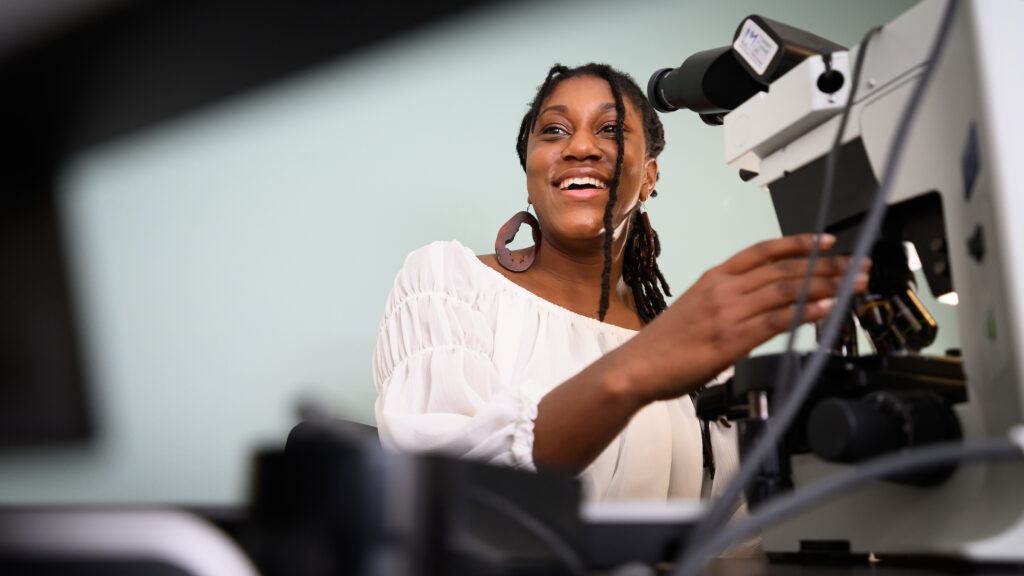
But Stephens doesn’t just read slides for diagnostic purposes. She contributes insight to collaborative research projects, such as one investigating a targeted chemotherapeutic injection in mice, and is learning to lead her own studies through a project defining porcine astrovirus-associated respiratory tract changes in pigs. Stephens will travel to Vienna, Austria, this fall to study porcine chlamydia with NC State assistant pathology professor Dr. Michael Rahe’s lab.
She has also taken advantage of externship opportunities available to residents, including shadowing a comparative pathologist at the Medical University of South Carolina and learning about digital pathology at Regeneron Pharmaceuticals.
“Dr. Jazz Stephens is a very intelligent and inquisitive resident who is driven by finding solutions to diagnostic mysteries,” says Dr. Abigail Armwood, an assistant clinical professor of pathology who coordinates the residency program. “She visibly lights up when she is talking about a particularly exciting case. Dr. Stephens has actively delved into multiple projects, acting as an excellent researcher and collaborator, and always stands out in rounds through her insightful contributions and thought-provoking questions.”
When she looks to the future, Stephens sees red — Wolfpack red, that is. She aspires to continue her research on the porcine immune response while earning a T32 grant-funded Ph.D. through NC State’s Comparative Biomedical Sciences Graduate Program.
“I really do think that I’ve had a transformative experience during residency,” Stephens says. “I think it’s made me not just a better pathologist, but also a better researcher and a better person. I’ve learned a lot, not just about pathology and research but about myself and my goals.”
This article is part of a series featuring house officers across the NC State College of Veterinary Medicine and Veterinary Hospital. Click here to find previous House Officer Highlight stories.
